This is a list of official languages by country and territory. It includes all languages that have official language status either statewide or in a part of the state, or that have status as a national language, regional language, or minority language.
This section needs additional citations for verification .(November 2017) |
This is a ranking of languages by number of sovereign countries in which they are de jure or de facto official, although there are no precise inclusion criteria or definition of a language. An '*' (asterisk) indicates a country whose independence is disputed.
Partially recognized or de facto independent countries are denoted by an asterisk (*)

Portuguese is a Western Romance language of the Indo-European language family originating from the Iberian Peninsula of Europe. It is the official language of Portugal, Brazil, Cape Verde, Angola, Mozambique, Guinea-Bissau and São Tomé and Príncipe, and has co-official language status in East Timor, Equatorial Guinea, and Macau. Portuguese-speaking people or nations are known as "Lusophones". As the result of expansion during colonial times, a cultural presence of Portuguese speakers is also found around the world. Portuguese is part of the Ibero-Romance group that evolved from several dialects of Vulgar Latin in the medieval Kingdom of Galicia and the County of Portugal, and has kept some Celtic phonology.

Rio Grande do Sul is a state in the southern region of Brazil. It is the fifth-most populous state and the ninth-largest by area. Located in the southernmost part of the country, Rio Grande do Sul is bordered clockwise by Santa Catarina to the north and northeast, the Atlantic Ocean to the east, the Uruguayan departments of Rocha, Treinta y Tres, Cerro Largo, Rivera, and Artigas to the south and southwest, and the Argentine provinces of Corrientes and Misiones to the west and northwest. The capital and largest city is Porto Alegre. The state has the highest life expectancy in Brazil, and the crime rate is relatively low compared to the Brazilian national average. Despite the high standard of living, unemployment is still high in the state, as of 2017. The state has 5.4% of the Brazilian population and is responsible for 6.6% of the Brazilian GDP.
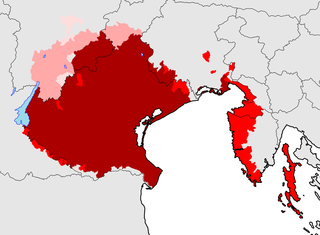
Venetian, wider Venetian or Venetan is a Romance language spoken natively in the northeast of Italy, mostly in Veneto, where most of the five million inhabitants can understand it. It is sometimes spoken and often well understood outside Veneto: in Trentino, Friuli, the Julian March, Istria, and some towns of Slovenia, Dalmatia (Croatia) and Bay of Kotor (Montenegro) by a surviving autochthonous Venetian population, and in Argentina, Australia, Brazil, Canada, Mexico, the United States and the United Kingdom by Venetians in the diaspora.
Hunsrik, also called Riograndese Hunsrik, Riograndenser Hunsrückisch or Katharinensisch, is a Moselle Franconian language derived primarily from the Hunsrückisch dialect of West Central German which is spoken in parts of South America. A co-official language in the Brazilian municipalities of Antônio Carlos, Santa Maria do Herval, and São João do Oeste, Hunsrik is spoken in the states of Rio Grande do Sul, Santa Catarina, and Paraná, as well as some regions of neighboring Paraguay and Argentina. It has been an integral part of the historical and cultural heritage of the Brazilian state of Rio Grande do Sul since 2012, and considered an intangible cultural heritage of Santa Catarina state since 2016.
Talian, or Brazilian Venetian, is a dialect of the Venetian language, spoken primarily in the Serra Gaúcha region in the northeast of the state of Rio Grande do Sul in Brazil. It is also spoken in other parts of Rio Grande do Sul, as well as in parts of Espirito Santo and of Santa Catarina.
The (Low)German-based varieties spoken by German Brazilians together form a significant minority language in Brazil. "Brazilian German" is strongly influenced by Portuguese and to a lesser extent by Italian dialects as well as indigenous languages. High German and Low Saxon/German dialects and Germanic languages are particularly strong in Brazil's South and Southeast Regions. According to Ethnologue, ca. 3 million people in Brazil speak the Hunsrik Language, 1.5 million speak Standard German.
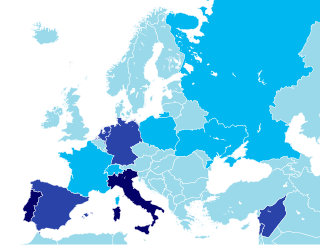
Immigration to Brazil is the movement to Brazil of foreign peoples to reside permanently. It should not be confused with the forcible bringing of people from Africa as slaves. Latin Europe accounted for four-fifths of the arrivals. This engendered a strikingly multicultural society. Yet over a few generations, Brazil absorbed these new populations in a manner that resembles the experience of the rest of the New World.
East Pomeranian or Farther Pomeranian is an East Low German dialect moribund in Europe, which used to be spoken in the region of Farther Pomerania when it was part of the German Province of Pomerania, until World War II, and today is part of Poland. Currently, the language survives mainly in Brazil, where it is spoken by descendants of German immigrants of the 19th century and where it was given its own script by the linguist Ismael Tressmann. It has co-official status in 11 Brazilian municipalities and has been recognized as a historical and cultural heritage of the Brazilian state of Espírito Santo. East Pomeranian is also spoken in central Wisconsin and parts of Iowa, in the United States.
Brazilian Sign Language is the sign language used by deaf communities of Brazil. It is commonly known in short as Libras.
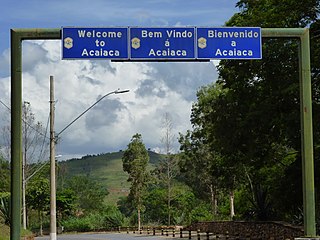
Portuguese is the official and national language of Brazil being widely spoken by most of the population. Brazil is the most populous Portuguese-speaking country in the world, with its lands comprising the majority of Portugal's former colonial holdings in the Americas.
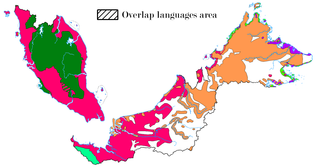
The indigenous languages of Malaysia belong to the Mon-Khmer and Malayo-Polynesian families. The national, or official, language is Malay which is the mother tongue of the majority Malay ethnic group. The main ethnic groups within Malaysia are the Malay people, Han Chinese people and Tamil people, with many other ethnic groups represented in smaller numbers, each with its own languages. The largest native languages spoken in East Malaysia are the Iban, Dusunic, and Kadazan languages. English is widely understood and spoken within the urban areas of the country; the English language is a compulsory subject in primary and secondary education. It is also the main medium of instruction within most private colleges and private universities. English may take precedence over Malay in certain official contexts as provided for by the National Language Act, especially in the states of Sabah and Sarawak, where it may be the official working language. Furthermore, the law of Malaysia is commonly taught and read in English, as the unwritten laws of Malaysia continue to be partially derived from pre-1957 English common law, which is a legacy of past British colonisation of the constituents forming Malaysia. In addition, authoritative versions of constitutional law and statutory law are continuously available in both Malay and English.

The languages of South America can be divided into three broad groups:
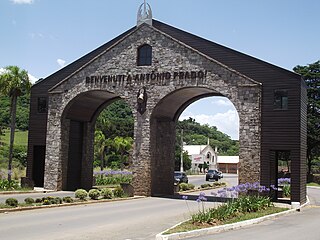
Antônio Prado is a municipality located in the Serra Gaúcha regionin The city is in the state of Rio Grande do Sul, Brazil. It boasts the largest collection of architectural heritage designated by IPHAN related to Italian colonization in Brazil. Its population is estimated at 13,041 people.

Flores da Cunha is a municipality in the state of Rio Grande do Sul, Brazil. It is the largest producer of wines inside Brazil. The Venetian language in its Brazilian form Talian is co-official with Portuguese in Flores da Cunha.
Serafina Corrêa is a municipality in the state of Rio Grande do Sul, Brazil.

Prudentópolis is a Brazilian municipality in the state of Paraná, in Southern Brazil. As of 2022, it had a population of 49,393 people.

Anti-discrimination laws in Brazil are present in the Constitution of Brazil, in the labour law, in the child and adolescent law, in the ageing law, and in the penal code.
Caipira is a Portuguese dialect spoken in the rural areas of the State of São Paulo and adjacent parts of neighbouring Mato Grosso do Sul, Goiás, Minas Gerais, and Paraná.
The Italian language in Brazil has been widespread since the second half of the 19th century, particularly due to Italian emigration to Brazil. Today there are an estimated 26 million descendants of Italians residing in the country; among them, Italian is estimated to be spoken as a first language by about 50,000 people. On the other hand, there were 407,924 Italian citizens residing in Brazil in 2013. In the state of Rio Grande do Sul, a Venetian linguistic island is still active, whose language is called talian. Italian is also being learned as a foreign language in Brazil by tens of thousands of students a year, partly due to the descendants of immigrants gradually recovering their origins.
In 1992, following further amendments to this directive, Latvian was established as the only official language. It took Journal of Multilingual and Multicultural Development seven more years before the State language law was adopted in 1999, with further amendments in the years 2000, 2001 and 2002.
{{cite web}}: CS1 maint: archived copy as title (link)Spanish is one of the most widely spoken languages in the world, and it is an official language, either de facto (in practice) or de jure (by law) in 20 countries. Spanish is also an official language in Puerto Rico, Gibraltar, the United Nations, the African Union, and the Organization of American States.